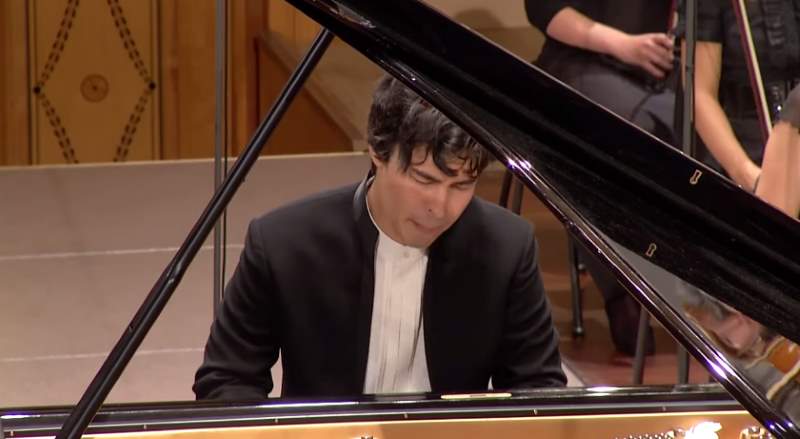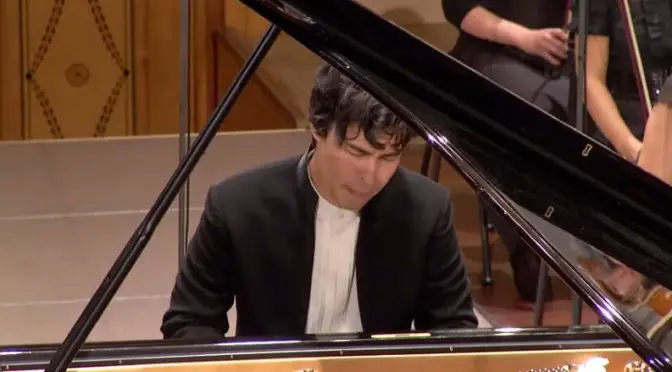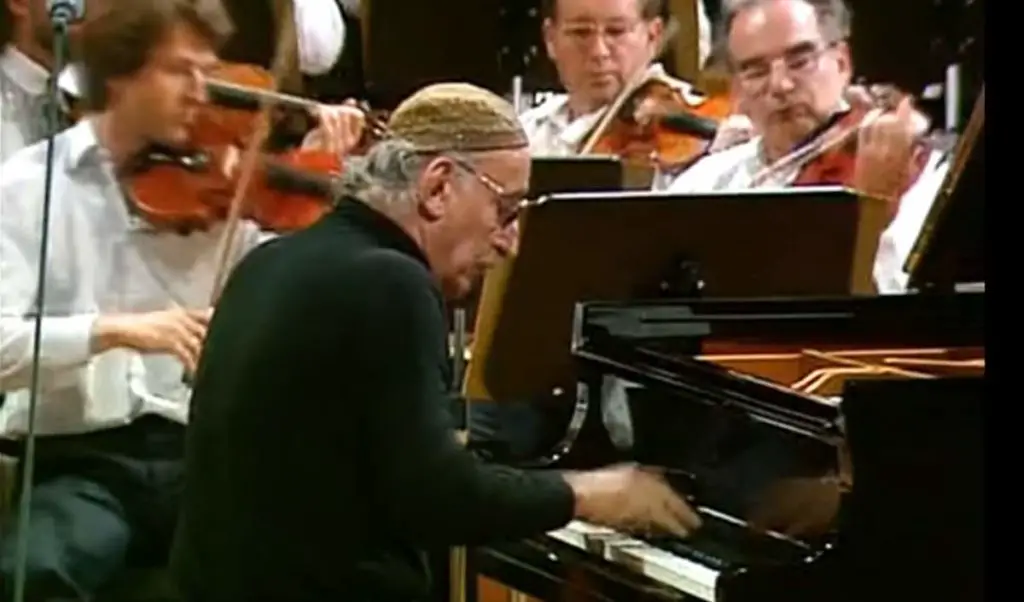Accompanied by the hr-Sinfonieorchester (Frankfurt Radio Symphony Orchestra), German-Korean pianist Christopher Park performs Wolfgang Amadeus Mozart’s Piano Concerto No. 20 in D minor, K. 466. Conductor: Paavo Järvi. Recorded at the Rheingau Musik Festival 2013 at Wiesbaden, Kurhaus. August 21, 2013.
Mozart’s Piano Concerto No. 20
Mozart’s Piano Concerto No. 20 was written in 1785. The first performance took place at the Mehlgrube Casino in Vienna on February 11, 1785, with the composer as the soloist (Mozart was widely considered the greatest pianist of his time).
The concerto is scored for solo piano, flute, two oboes, two bassoons, two horns, two trumpets, timpani, and strings. The three movements are:
- Allegro (in D minor) The first movement starts off the concerto in the dark tonic key of D minor with the strings restlessly but quietly building up to a full forte. The theme is quickly taken up by the piano soloist and developed throughout the long movement. A slightly brighter mood exists in the second theme, but it never becomes jubilant. The timpani further heightens the tension in the coda before the cadenza. The movement ends on a quiet note.
- Romanza (in B-flat major) The second movement of Mozart’s Piano Concerto No. 20 is a strophic romanza whose customary tranquility at first seems reinforced by its B-flat major key and the support that piano and orchestra provide each other by passing around and even completing each other’s phrases but then is torn by a strong central agitated section in g-minor.
- Allegro assai (in D minor, ending in D major) The finale of Mozart’s Piano Concerto No. 20, a rondo, begins with the solo piano rippling upward in the home key before the full orchestra replies with a furious section. (This piano “rippling” is known as the Mannheim Rocket and is a string of eighth notes (d-f-a-d-f) followed by a quarter note (a). A second melody is touched upon by the piano where the mood is still dark but strangely restless. A contrasting cheerful melody in F major ushers in not soon after, introduced by the orchestra before the solo piano rounds off the lively theme. A series of sharp piano chords snaps the bright melody and then begins passages in D minor on solo piano again, taken up by a full orchestra. Several modulations of the second theme (in A minor and G minor) follow. Thereafter follows the same format as above, with a momentary pause for introducing the customary cadenza. After the cadenza, the mood clears considerably and the bright happy melody is taken up this time by the winds. The solo piano repeats the theme before a full orchestral passage develops the passage, thereby rounding up the concerto with a jubilant D major finish.
Christopher Park

Born in Bamberg, Germany (30 July 1987), Christopher Park received his first piano lessons at the age of 7.
As a young student at the age of 12, Christopher Park was accepted into the class of Prof. Thomas Duis. In the past few years, Mr. Park won several international competitions around the world, among these in New York, Hamburg, Nürnberg, and Rhodes.
In 2004, Park was introduced to Prof. Lev Natochenny, himself a rare disciple of legendary Lev Oborin and David Oistrakh, and has been accepted into his famous “Meisterklasse” at the University of Music and Performing Arts in Frankfurt am Main.
Through master classes and concerts, including performances at the Weilburger Schlosskonzerte, the Frankfurt Fest der Musik, Alte Oper, Summit Music Festival in New York and Burgos, Christopher Park received musical inspiration from such luminaries as Lev Natochenny, Gary Graffman, Cyprien Katsaris, Karl-Heinz Kämmerling, Vladimir Krainev, and Lars Vogt, to name a few.
These valuable experiences and studies gave him the opportunity to perform concerts in Germany, Greece, Italy, Spain, France, and the United States. Christopher Park also recorded for German Radio and Television broadcasts.
In January 2008 the young pianist was awarded the Culture Prize 2008 of the Hauck & Aufhäuser Cultural Foundation for his outstanding musical accomplishments. After that, he became the recipient of the Arte Musica Foundation scholarship.
In addition to his career as a soloist, Mr. Park is involved both in concert, as well as in CD recordings in chamber music and vocal accompaniment, which he has made with such illustrious musicians as Richard Yongjae O’Neill and Sumi Jo.
Sources
- Piano Concerto No. 20 (Mozart) on Wikipedia
- Wolfgang Amadeus Mozart’s Piano Concerto # 20 in d minor on ClassicalNotes.net


